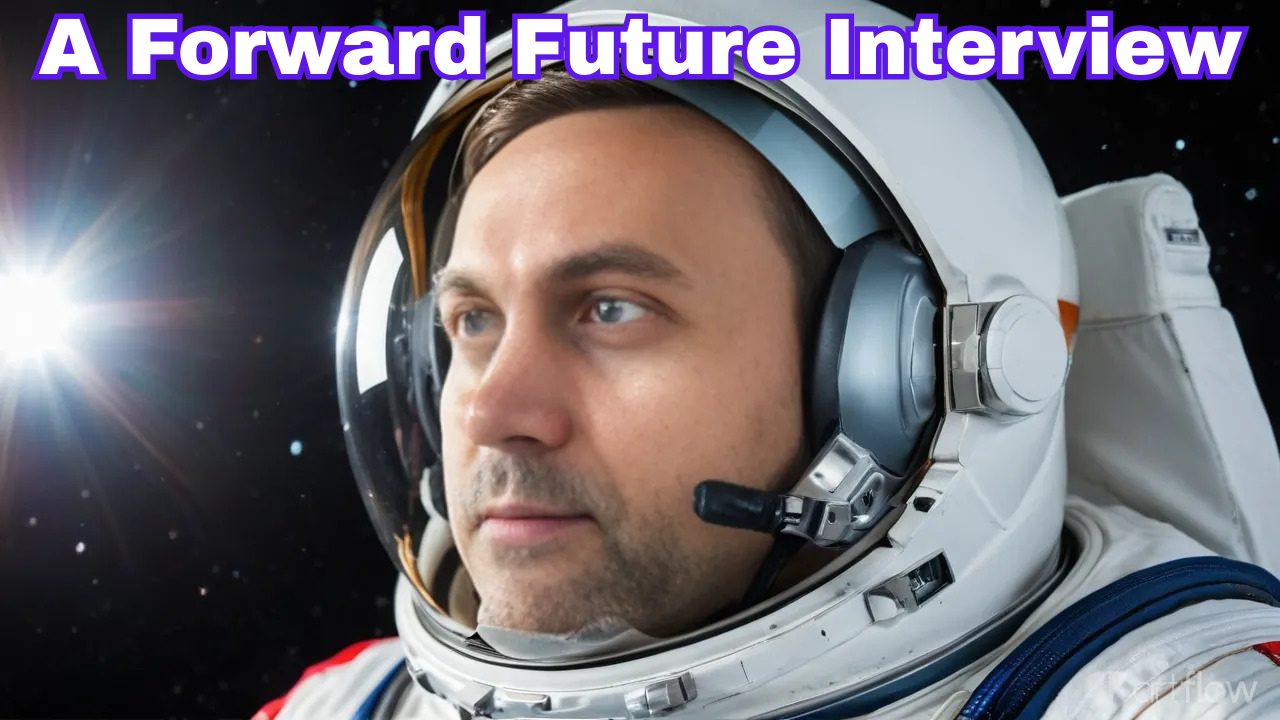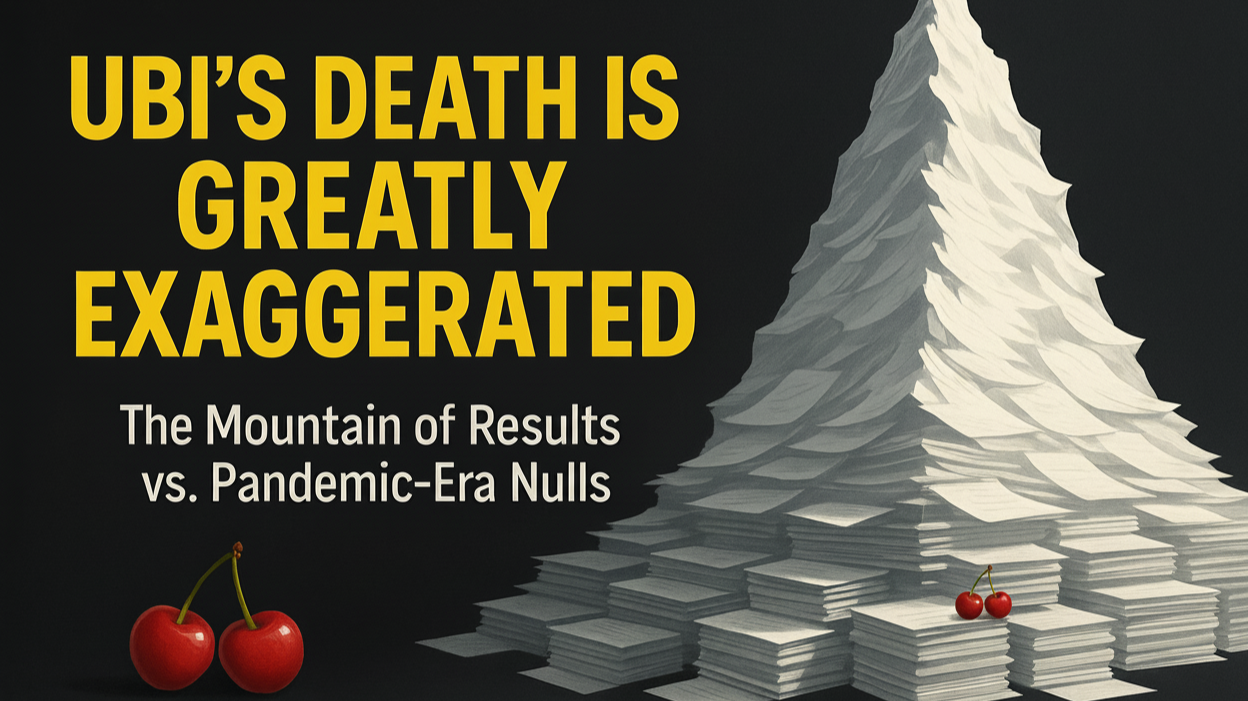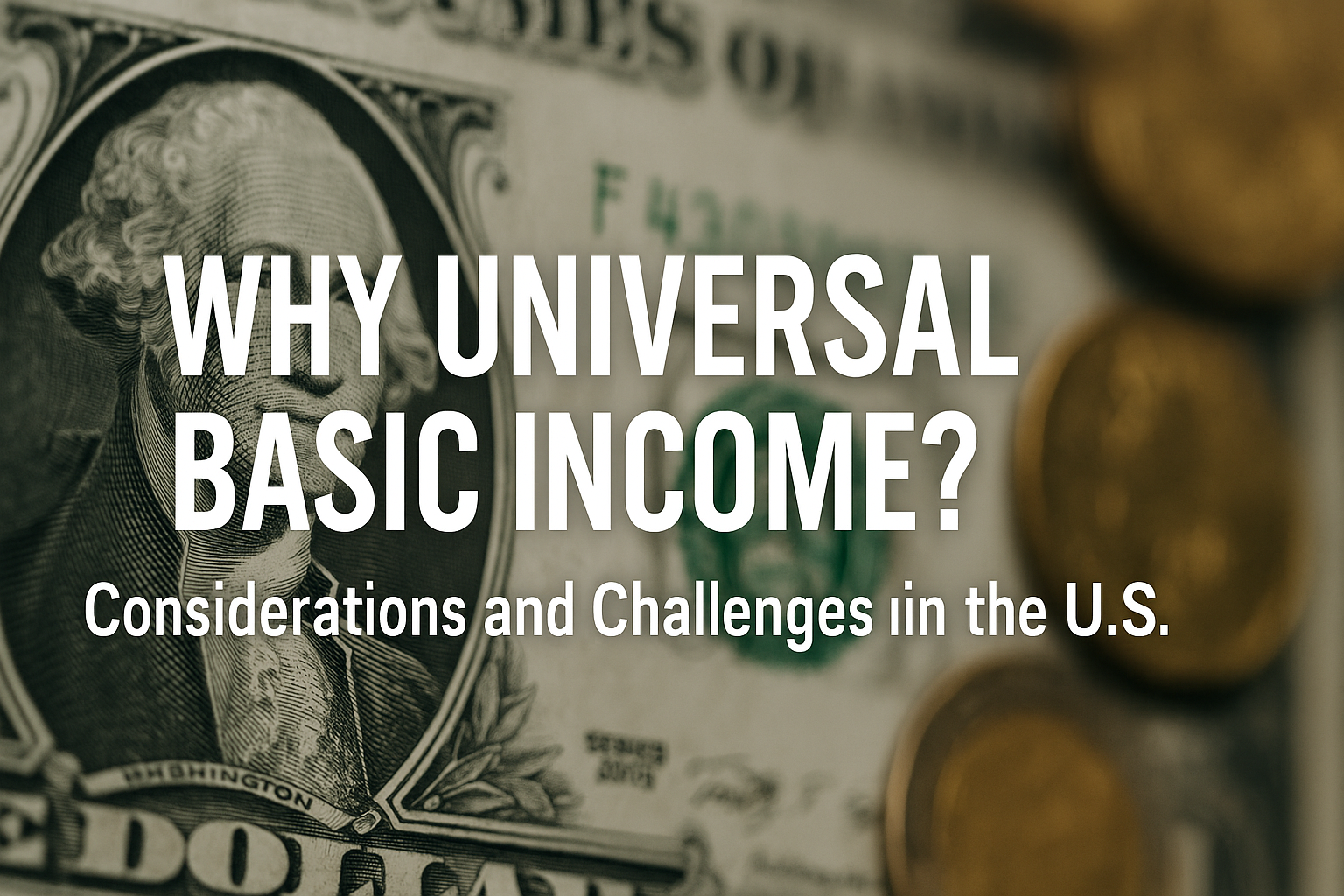AI, Automation, and the Urgent Case for Universal Basic Income

The following interview was with Nick Wentz of Forward Future Daily, a newsletter launched by Matthew Berman focused on bringing the benefits of AI to all of humanity. It was originally published in two parts (part one and part two). If you want to keep up with AI news, consider subscribing to Forward Future.
by Nick Wentz
Scott Santens has long been one of the most compelling voices in the push for Universal Basic Income (UBI). As AI and automation accelerate, his work—once seen as speculative—feels more prescient than ever. We sat down with Scott to explore the economic transformations ahead, the risks of inaction, and why UBI may be the most powerful idea for the 21st century economy.
From Curiosity to Advocacy: Scott's Path to UBI
Scott Santens didn't set out to become a leading policy voice. But in the early 2010s, a convergence of economic research, firsthand observations, and technological breakthroughs pushed him toward a singular idea: we need a new foundation for economic security.
"I got into this back in 2013, and the route that I took was through technology and automation," Santens recalls. "At the time, no one was really talking about the impacts of automation."
A conversation on Reddit about advancing technology sparked his interest, leading him to read "Manna" by Marshall Brain—a science fiction novella that presents two possible futures: one where we continue our current trajectory, and another where technology benefits everyone.
This exploration led Santens to discover the rich history of basic income, from Thomas Paine's writings shortly after America's founding to Nixon's Family Assistance Plan, which passed the House twice in the late 1970s but never cleared the Senate.
"I was fascinated to learn about the pilots that had gone on back then, both in the US and Canada, and then the pilots more recently all over the world," he explains. "They all pointed in the same direction—this is a good idea, it works."
What began as an interest in technology's potential impacts evolved into a comprehensive understanding that basic income isn't just a future necessity—it's something "we actually should have done decades ago, if not centuries ago."
AI’s Economic Disruption & the Case for UBI
AI Isn't Just Another Industrial Shift
We've seen automation reshape economies before—from mechanized agriculture to digital tools. But according to Santens, AI-driven automation is fundamentally different.
"This time, we're not just automating physical labor or repetitive tasks—we're automating cognitive labor, decision-making, and even creativity."
That shift, he argues, breaks the traditional cycle where technology destroys some jobs but creates new ones. With models like DeepSeek drastically lowering the cost of AI, Santens sees automation spreading faster and further than before.
The release of ChatGPT in November 2022 was a pivotal moment for Santens. "I've been talking about this for a decade now, and it feels like it's arrived. This moment has arrived, and we're going to start seeing AI advance quickly, and we're going to start seeing economic displacement as a result."
In response, he founded the Income to Support All Foundation to accelerate projects addressing these technological changes. The rapid advancement of AI models like DeepSeek demonstrates how quickly capabilities are evolving, making it increasingly difficult to slow development.
"We're ramping up one after the other after the other, and it makes it that much harder for any voice that's saying to slow things down to actually achieve that," Santens warns. "There will not be any slowing of this down."
Productivity Without Prosperity
In his viral article "The Real Story of Automation," Santens highlights a critical disconnect: economic productivity has soared, but the rewards haven't reached most people.
"In general, I think people have a bad picture of the impacts of automation," he explains. "A key moment in US history was when productivity decoupled from wage growth. Prior to 1973, productivity grew with wages—they were linked together pretty well. Then in 1973, that stopped being true."
Productivity continued to rise through computerization, but wages stagnated in comparison. The result has been massive inequality growth.
"A study done in 2018 determined that because of inequality growth, $50 trillion that would have flowed to the bottom 90% as wages flowed mostly to the top 1%. They updated that analysis earlier this year, and now it went from $50 to $79 trillion," Santens notes. "In 2018, the annual 'loss' was 2.3 trillion, and now per year it's 3.9 trillion."
Santens argues that the real, existing impact of automation isn't mass unemployment but rather this staggering inequality. "That's what I want people to understand—don't only be looking for increases in unemployment rates. Look for increases in inequality and continued wage stagnation."
Why Universal Basic Income?
To Santens, UBI isn't just a policy idea—it's a necessary adaptation to our evolving economic reality. He describes UBI through a powerful framework: "It's the power to say no and the freedom to say yes."
The "power to say no" provides bargaining power—the ability to refuse exploitative or degrading work because basic survival isn't at stake. This changes the fundamental nature of employment.
"Work isn't really fully voluntary if we say, 'If you don't work, you deserve to starve.' It is voluntary if you have enough to survive and exist. Then employers actually pay you money to attract you to do the job," Santens explains.
The "freedom to say yes" enables people to pursue meaningful work that might not pay well, volunteer in their communities, or develop creative talents. "Right now, when you look at jobs that are more meaningful or volunteer opportunities, you have to be able to afford to do them," he notes.
Santens identifies three primary pathways through which UBI functions: reducing poverty, reducing insecurity, and reducing inequality.
For poverty reduction, Santens argues that UBI is more effective than means-tested programs because it reaches everyone. "The best welfare program that we have is SNAP, otherwise known as food stamps, and that goes to about two out of three people in poverty," he says. Other programs reach even fewer eligible recipients—TANF (Temporary Assistance for Needy Families) reaches only one in five people in poverty.
UBI also eliminates the high marginal tax rates that many welfare programs impose. "Imagine if someone was getting $1,000 per month, and they were offered a $1,000 per month job, and they took the job and they lose their original thousand dollars per month," Santens illustrates. "That's effectively a 100% tax rate. They're not earning any additional income."
With UBI, people never lose their basic income when they earn more, which means "it always makes sense to earn that extra additional dollar."
For economic insecurity, UBI creates a floor below which no one can fall. "If you got a $15,000 UBI floor and you're earning $25,000 a year, then now you're at $40,000 before taxes, and that's a much better place to be," Santens explains. "You also know that if you do lose your $25,000 job, you will only ever fall to 15,000. You will not fall to zero."
This security reduces chronic stress, improving mental and physical health, and even cognitive capacity. Studies have shown that relieving financial stress can improve cognitive performance by the equivalent of 13 IQ points.
For inequality, UBI paired with progressive taxation can reverse the decades-long flow of wealth to the top 1%. "If you lift everyone up, you're providing more to the middle class too. You're not only boosting the bottom, you're boosting the middle, and you're pressing down on the top thanks to higher taxes," Santens says.
The Critics: Can We Afford It? Will It Cause Inflation?
The most common objections to UBI are concerns about cost, inflation, and work incentives. Santens tackles each head-on.
Regarding cost, Santens argues that many misunderstand UBI's true financial impact:
"A lot of people misunderstand the cost of universal basic income as its gross cost instead of its net cost."
The gross cost would be the UBI amount multiplied by the number of recipients. But this doesn't account for the tax side of the equation. For many people in the middle class, increased taxes would offset their UBI payment, resulting in a neutral impact. "You can't count that as part of the cost because there's nothing happening there," Santens explains.
The true cost of UBI is the difference between what net beneficiaries receive and what their taxes are. Depending on the details, the net cost is roughly a third of the gross cost.
Santens also emphasizes that implementing UBI would allow for reforming or eliminating some existing welfare programs and tax expenditures, reducing the overall cost. One proposal he mentions would provide a $500 monthly UBI to everyone—adults and children—funded by just a 7% income surtax.
Most importantly, Santens asks, "What does it cost to not do a basic income?" Poverty, chronic insecurity, and extreme inequality generate enormous costs in healthcare, crime, lost productivity, and human potential. "If we're spending $4 trillion on the downstream costs of poverty as a whole, and the net cost of basic income is $1.5 trillion, then that's a net benefit."
On inflation, Santens acknowledges this as the strongest critique of UBI. "Inflation is definitely a concern to have, and you should plan around that in any implementation," he advises.
Several factors influence potential inflationary pressure: the UBI amount, how it's funded (through taxes or deficit spending), which existing programs it replaces, and supply-side policies to ensure adequate housing, food, and other necessities.
"You want to make sure that we do give people money to afford rent and mortgages, but then we've got to make sure that there's enough housing or else prices will go up," Santens explains. He suggests pairing UBI with policies like zoning reform to increase housing supply and land value taxes to encourage development.
Steelmanning the Opposition
When asked to present the strongest argument against UBI, Santens points to inflation concerns as the most legitimate critique—but one that can be addressed through careful policy design.
The argument about work disincentives, however, isn't supported by evidence from UBI pilots. Research consistently shows minimal impact on work, with any reductions coming primarily from secondary earners (like parents of newborns) and young adults pursuing education.
"If you look at Sam Altman's pilot, which showed about a 2% reduction in work, that works out to people working 15 minutes less per workday," Santens explains. "You can think of it as an 8-day paid leave per year, which still puts us below every other developed country."
Alaska's Permanent Fund Dividend, running since 1982, demonstrates the long-term effects of a UBI-like program. Studies found a neutral impact on full-time employment (decreases balanced by job creation from increased spending) and a 17% increase in part-time work.
In the Stockton, California pilot, recipients actually increased their full-time employment compared to non-recipients. "It costs money to work," Santens explains. "Maybe you need to buy a suit or take time off for an interview. With that cushion, you can take that job interview and hopefully get a better job."
Beyond employment, UBI pilots have shown surprising benefits: Finland's experiment increased trust in government, institutions, and fellow citizens. In Canada's 1970s experiment, researchers measured an 8.5% reduction in hospitalizations, a 15% decrease in overall crime, and a 37% decrease in domestic violence.
Can We Get There? The Politics of UBI
Despite growing evidence supporting UBI, implementation remains a political challenge. Santens points to the failed effort to extend the expanded Child Tax Credit in 2021 as an illustration of the hurdles.
"We had six months of the enhanced child tax credit. The average payment was going to about 90% of kids in the country, around $440 per month. It reduced child poverty by 40%," Santens recalls. "It should have been a no-brainer with child poverty costing as much as it does."
Yet the program ended because of opposition from Republicans and Senator Joe Manchin, who expressed concerns about parents using the money for drugs—despite evidence showing parental drug use actually declined during the program.
The core political obstacle, according to Santens, is a deeply held belief that assistance should be conditional on work. "Their logic is, if you're not doing anything to help yourself, then you don't deserve any help," he explains.
Yet this principle is inconsistently applied. "It's not like they're trying to attach a work requirement to stock dividends or savings earned from giant piles of money," Santens points out.
"If you have a bunch of money, you can put that in the bank or into stocks and earn all kinds of passive income, sit on the beach, and just have a great old life not doing any work at all. They don't care about that."
The Future of Work—and Life—in a UBI World
Looking toward implementation, Santens believes the logistics of administering UBI are straightforward. "We saw the IRS roll out the child tax credit immediately and highly successfully," he notes. "Social Security is always the other choice. They're very good at getting monthly checks out, and of course it'd be even easier if everyone's monthly check was the same amount."
One innovative funding approach Santens suggests is creating a sovereign wealth fund that receives a small percentage of public company stocks each year. "Each company would put 1% of their stocks into this fund each year," he explains. "This fund would grow, and we as American citizens could actually benefit from stock market growth. We'd have skin in the game."
This approach connects to Santens' view that all citizens should be seen as stakeholders in the economy, particularly as AI advances. "Who trained the AI? Our data did. It was all of our data—all the stories and text and every usage of all these platforms, images, books, songs, videos. We all made it," he argues. "That was our capital that we put into making this possible. We should see ourselves as stockholders."
As we stand at the threshold of an AI-accelerated economy, Santens urges immediate action rather than waiting for mass displacement. "Are we going to wait till then to actually have a policy in place? I think that's unwise. We should get ahead of this and start doing this now."
His final message is clear: "AI could double or triple productivity, but if we don't redesign how gains are distributed, we'll see even more concentration of wealth and power. Universal Basic Income isn't a utopian dream—it's a practical response to the world we're entering."
If you support my UBI advocacy, please share this post and click the subscribe button. Also consider making a monthly pledge in support of my work.

Special thanks to my monthly supporters on Patreon: Gisele Huff, Haroon Mokhtarzada, Steven Grimm, Judith Bliss, Lowell Aronoff, Jessica Chew, Katie Moussouris, David Ruark, Tricia Garrett, A.W.R., Daryl Smith, Larry Cohen, Philip Rosedale, Liya Brook, Frederick Weber, John Steinberger, Laurel gillespie, Dylan Hirsch-Shell, Tom Cooper, Robert Collins, Joanna Zarach, Mgmguy, Daragh Ward, Albert Wenger, Andrew Yang, Peter T Knight, Michael Finney, David Ihnen, Steve Roth, Miki Phagan, Walter Schaerer, Albert Daniel Brockman, Natalie Foster, Joe Ballou, Arjun , S, Jocelyn Hockings, Mark Donovan, Jason Clark, Chuck Cordes, Mark Broadgate, Leslie Kausch, Braden Ferrin , Juro Antal, Austin Begin, Deanna McHugh, Stephen Castro-Starkey, Nikolaus Rath, and all my other supporters.
UBI Guide Newsletter
Join the newsletter to receive the latest updates in your inbox.



